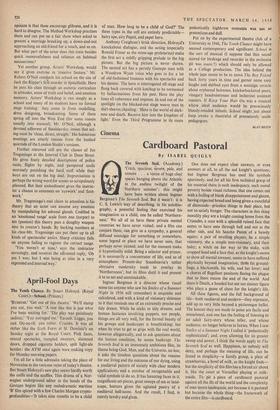April-Fool Days
The Tenth Chance. By Stuart Holroyd. (Royal Court.)—School. (Princes.) `Ituriatsri."Get out of this theatre.' We'll stamp you out, you wait.' A row like this is just what I've been waiting for.' The play was pointlessly sadistic.' You outraged me.' Yarooh. Leggo, you cad. Ou-oo-ch, you cotter. Crumbs. It was all rather like the Sixth Form at St. Dominic's on Sunday night at the Royal Court. Pink faces, misted spectacles, rumpled sweaters, slammed doors, dropped cigarette holders, spilt light-ale bottles : the AYM once again were making copy for Monday morning papers.
I'm all for a little adrenalin taking the place of Novocaine in the varicose veins of today's theatre. But Stuart Holroyd's new play seems hardly worth the sniffs and the scuffles. This drama of a Nor- wegian underground editor in the hands of the Gestapo begins like any melodramatic wartime 'B' film spiced with a few Charles Morgan crypto- profundities—'It takes nine months to be a child of man. How long to be a child of God?' The three types in the cell are entirely predictable— hairy ape, airy Papist, and paper hero.
Anthony Creighton's brisk direction, Holroyd's knockabout dialogue, and the acting (especially Ronald Fraser as the stone-age proletarian) make the first act a mildly gripping prelude to the big picture. But the big picture is never shown. The second act has a parody Gestapo man with a Woodrow Wyatt voice who goes in for a lot of old-fashioned business with his spectacles and his dossier. The hero is interrogated off-stage and flung back covered with ketchup to be tormented by hallucinations from his past. Here the play loses all coherence and impetus. In and out of the spotlight on the blacked-out stage weave men in shirt-sleeves chanting: 'Here is the world of dark- ness and death. Receive him into the kingdom of light.' Even the Third Programme in its more pedantically highbrow moments was not so pretentious and dull.
Put on by the experimental theatre club of a University in 1946, The Tenth Chance might have seemed contemporary and significant. School is the sort of musical (I suppose that thin sound scored for birdcage and recorder in the orchestra pit was music?) which should only be allowed as a College production. The idea behind the whole jape seems to be to move The Boy Friend back forty years in time and garner some easy laughs and dabbed eyes from a nostalgic reverie about orphaned heiresses, knickerbockered peers, vinegary headmistresses and lecherous assistant masters. If Keep Your Hair On was a musical whose ideal audience ,would be precociously bloody-minded infant's, School might, just about keep awake a theatreful of prematurely senile pedagogues.
ALAN BRIEN


































 Previous page
Previous page